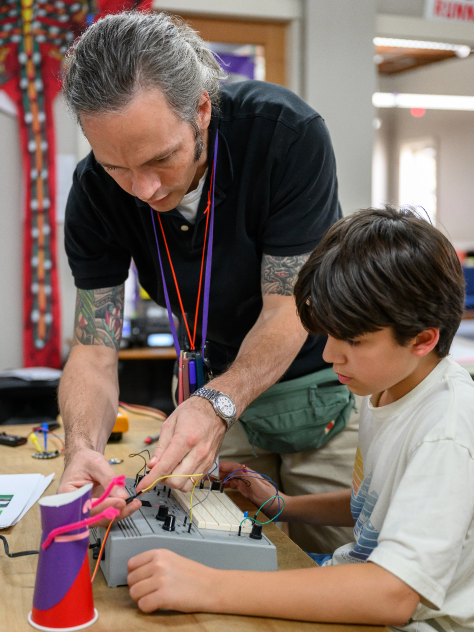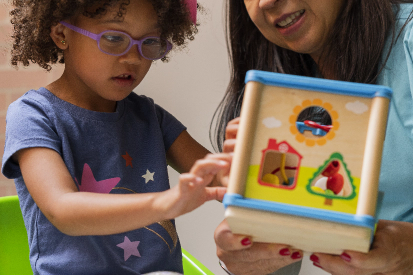
Starting a Montessori School
The American Montessori Society can help guide you on the journey of launching a Montessori program with these key areas of consideration.
Mission, Vision, & Values
One of the first things we recommend is creating mission and vision statements for your school. These will lay a foundation for all that comes next.
Your School Community
Staffing
Hiring teachers with Montessori credentials specific to their age level is crucial for maintaining your school’s quality. Credentials from the American Montessori Society (AMS), the Association Montessori Internationale, and any program accredited by the Montessori Accreditation Council for Teacher Education ensure rigorous standards.
Other staffing considerations include:
- Meeting state-mandated student-to-teacher ratios
- Hiring school administrators and facility managers
- Hiring specialists, such as art teachers and speech therapists, who may or may not be Montessori-credentialed
Student Recruitment
There are many ways to engage prospective students for your new school:
- Create a website and admissions materials that present a unified message.
- Hold open houses, classroom observation visits, and workshops.
- Give presentations at feeder schools, community centers, and libraries.
- Advertise via local newspapers, radio, the Internet, phone directories, doctors’ offices, and community bulletin boards.
To ensure credibility and standardization, create clear application and enrollment procedures, and admit students based on objective criteria. In a tuition-based setting, require a signed payment schedule and non-refundable deposit at registration, and establish a process for financial aid or scholarships if applicable.
Classrooms
Regardless of age, an ideal Montessori classroom should be safe, beautiful, and inviting. It should reflect the Montessori approach with well-organized furnishings, distinct curricular areas, and spaces that encourage exploration and choice.
Each classroom will be tailored to its students’ needs. For example, Early Childhood rooms should have low chairs and tables, reachable shelves, a quiet reading corner, and child-sized kitchen tools to support independence and fine motor skills.
Materials
AMS considers the use of Montessori materials essential for quality implementation. To support this, the AMS School Accreditation Commission and AMS Teacher Education Action Commission provide lists of recommended materials for each Montessori classroom level. Click the links below to view/ download suggested materials lists:
- Click to download Infant & Toddler materials list
- Click to download Early Childhood materials list
- Click to download Elementary materials list
- Click to download Secondary materials list
Find Montessori learning materials in our Montessori Marketplace
Expenses
Initial expenses may include property purchase or rental, construction, renovations, architectural and contractor fees, legal and financial services, classroom furnishings, Montessori materials, outdoor play areas, office equipment, technology, and marketing.
In your budget, project faculty and staff salaries, and include ongoing costs such as rent or mortgage, facilities maintenance, depreciation, loan interest, taxes, insurance (health, workers’ compensation, liability), scholarships, and financial aid. Also, allocate funds for professional development and memberships, including AMS membership for your school and teachers.
Income & Capital
Income sources can include school tuition, application fees, extended care and/or summer activities, and fundraising. Financing options may include personal savings, small business loans, personal loans, private investors, and/or grants.
Legal Matters
Legal counsel will be essential to helping you navigate such matters as:
- School type
- Lease agreements and/or mortgages
- Writing agreements and contracts (e.g., employment, admission)
- Writing policies (e.g., non-discrimination, bullying)
- State and local regulations, including zoning, licensing, health, safety, fire, student-to-teacher ratios, and space requirements*
Also, as applicable:
- Writing by-laws
- Developing a board of trustees
- Applying for tax exemption
* The U.S. Department of Education’s “State Regulation of Private Schools” may serve as a helpful resource.
Resources Make a Difference
Professional Development
- Unlimited access to AMS Learning on-demand videos
- Discounts on live courses and certificate program
Community Connection
- Access to AMS Connect
- AMS Connect Live networking sessions
- AMS affinity groups
Subscriber Resources
Sample materials including:
- School handbooks
- Policies
- Form templates
- “How to” sheets
Event & Product Discounts
- Discounted tickets to The Montessori Event and other AMS events
- Access to Member Appreciation Day and other professional development events
- Access to Montessori Life article archive














